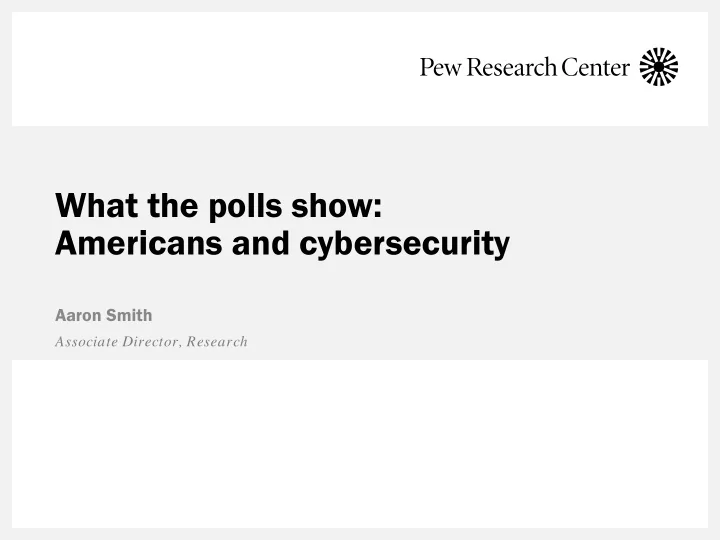

What the polls show: Americans and cybersecurity Aaron Smith Associate Director, Research
Overview of our cybersecurity work Part o t of our ur o ong ngoing w work o on n Americans’ privacy y atti ttitud udes and nd b behaviors • Two polls f lls field lded i in 2016 • Cond nducted o onl nline ne o of a na nati tionally r y representative s sample of American adul ults • Sur urvey o one ne c covered A Americans’ atti ttitudes and nd b behaviors a around und c cyb ybersecurity • Experiences with info theft, confidence in institutions to protect their info • Behaviors around password management and other security protocols • General attitudes towards cybersecurity issues • Su Survey two c covered Am Americ icans’ cybersecurity k knowledge • 2 July 20, 2017
Many Americans have personal experience w/ data theft Survey conducted March 30-May 3, 2016 3 July 20, 2017
Public expresses broad concerns that personal data has grown less secure Survey conducted March 30-May 3, 2016 4 July 20, 2017
Low confidence in many institutions to protect personal info Survey conducted March 30-May 3, 2016 5 July 20, 2017
Memorization is by far the most common way Americans keep track of their passwords Survey conducted March 30-May 3, 2016 6 July 20, 2017
Many engage in subpar password practices Survey conducted March 30-May 3, 2016 7 July 20, 2017
More broadly, a substantial minority express worry and stress about password management Survey conducted March 30-May 3, 2016 8 July 20, 2017
Many are neglecting basic smartphone cybersecurity measures Survey conducted March 30-May 3, 2016 9 July 20, 2017
Roughly half of online adults use public wi-fi, in some cases for sensitive activities Survey conducted March 30-May 3, 2016 10 July 20, 2017
Public knowledge of cybersecurity issues is generally low Survey conducted June 17-27, 2016 11 July 20, 2017
A few takeaways 1) In g gen ener eral, Amer mericans don’t “g “grade” pa particularly wel ell o on t this subject. 2) The p peopl ple e who y you think m k might k t know a a lot a about t this i issue? e? That i t isn’t t always the c e case. 3) Peo eopl ple d don’t res espo pond to “c “cyber ersecurity s stress” i in the w e way peo peopl ple i in the e cybersec ecurity ty f field m might w t want t t them m to – instead of of lock ocking d down t the he door oors, t the hey are e in ma many c cases t taki king t the e pa path o of lea east r res esistance. 4) More b e broadly, ther ere i is a disconnect between peo people’s a attitudes a about t this i issue an and their ir b behavio iors. 12 July 20, 2017
Recommend
More recommend